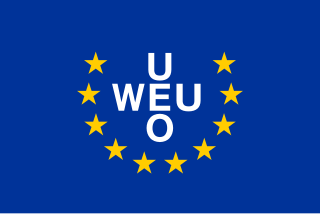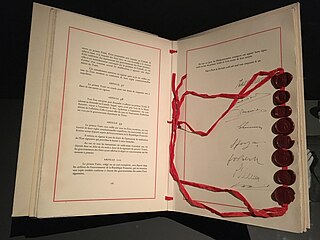Related Research Articles

The Council of the European Union, often referred to in the treaties and other official documents simply as the Council, and informally known as the Council of Ministers, is the third of the seven Institutions of the European Union (EU) as listed in the Treaty on European Union. It is one of two legislative bodies and together with the European Parliament serves to amend and approve or veto the proposals of the European Commission, which holds the right of initiative.

The European Parliament (EP) is one of the legislative bodies of the European Union and one of its seven institutions. Together with the Council of the European Union, it adopts European legislation, following a proposal by the European Commission. The Parliament is composed of 705 members (MEPs). It represents the second-largest democratic electorate in the world, with an electorate of 375 million eligible voters in 2009.

The Treaty on European Union, commonly known as the Maastricht Treaty, is the foundation treaty of the European Union (EU). Concluded in 1992 between the then-twelve member states of the European Communities, it announced "a new stage in the process of European integration" chiefly in provisions for a shared European citizenship, for the eventual introduction of a single currency, and for common foreign and security policies. Although these were widely seen to presage a "federal Europe", the focus of constitutional debate shifted to the later 2007 Treaty of Lisbon. In the wake of the Eurozone debt crisis unfolding from 2009, the most enduring reference to the Maastricht Treaty has been to the rules of compliance – the "Maastricht criteria" – for the currency union.

The president of the European Commission is the head of the European Commission, the executive branch of the European Union (EU). The president of the Commission leads a cabinet of Commissioners, referred to as the College. The president is empowered to allocate portfolios among, reshuffle, or dismiss Commissioners as necessary. The College directs the commission's civil service, sets the policy agenda and determines the legislative proposals it produces. The commission is the only body that can propose or draft bills to become EU laws.

The Western European Union was the international organisation and military alliance that succeeded the Western Union (WU) after the 1954 amendment of the 1948 Treaty of Brussels. The WEU implemented the Modified Brussels Treaty. During the Cold War, the Western Bloc included the WEU member-states, plus the United States and Canada, as part of the North Atlantic Treaty Organization (NATO).

The Treaty of Nice was signed by European leaders on 26 February 2001 and came into force on 1 February 2003.

The Treaty of Paris was signed on 18 April 1951 between France, Italy, West Germany, Belgium, Luxembourg, and the Netherlands, establishing the European Coal and Steel Community (ECSC), which subsequently became part of the European Union. The treaty came into force on 23 July 1952 and expired on 23 July 2002, exactly fifty years after it came into effect.

Comitology in the European Union refers to a process by which EU law is implemented or adjusted by the European Commission working in conjunction with committees of national representatives from the EU member states, colloquially called "comitology committees". These are chaired by the European Commission. The official term for the process is committee procedure. Comitology committees are part of the EU's broader system of committees that assist in the making, adoption, and implementation of EU laws.

The Treaty of Accession 2003 was the agreement between the member states of the European Union and ten countries, concerning these countries' accession into the EU. At the same time it changed a number of points which were originally laid down in the Treaty of Nice. The treaty was signed on 16 April 2003 in Athens, Greece and it entered into force on 1 May 2004, resulting in enlargement of the European Union with 10 states.

A European political party, known formally as a political party at European level and informally as a Europarty, is a type of political party organisation operating transnationally in Europe and within the institutions of the European Union (EU). They are regulated and funded by EU Regulation No. 1141/2014 on European Political Parties and European Political Foundations and their operations are supervised by the EU Authority for European Political Parties and European Political Foundations. European political parties – usually consisting of national parties, not individuals – have the exclusive right to campaign during the European elections and express themselves within the European Parliament by their affiliated political groups and their MEPs. Europarties influence the decision-making process of the European Council through coordination meetings with their affiliated heads of state and government. They also work closely and co-ordinate with their affiliated members of the European Commission.

European Union citizenship is afforded to all nationals of member states of the European Union (EU). It was formally created with the adoption of the 1992 Maastricht Treaty, at the same time as the creation of the EU. EU citizenship is additional to, as it does not replace, national citizenship. It affords EU citizens with rights, freedoms and legal protections available under EU law.

The European Union adopts legislation through a variety of legislative procedures. The procedure used for a given legislative proposal depends on the policy area in question. Most legislation needs to be proposed by the European Commission and approved by the Council of the European Union and European Parliament to become law.

The European Union (EU) is a political and economic union of 27 member states that are party to the EU's founding treaties, and thereby subject to the privileges and obligations of membership. They have agreed by the treaties to share their own sovereignty through the institutions of the European Union in certain aspects of government. State governments must agree unanimously in the Council for the union to adopt some policies; for others, collective decisions are made by qualified majority voting. These obligations and sharing of sovereignty within the EU make it unique among international organisations, as it has established its own legal order which by the provisions of the founding treaties is both legally binding and supreme on all the member states. A founding principle of the union is subsidiarity, meaning that decisions are taken collectively if and only if they cannot realistically be taken individually.

The procedures for voting in the Council of the European Union are described in the treaties of the European Union. The Council of the European Union has had its voting procedure amended by subsequent treaties and currently operates on the system set forth in the Treaty of Lisbon. The system is known as qualified majority voting is a type of consociational democracy.

The Treaty on the Functioning of the European Union (TFEU) is one of two treaties forming the constitutional basis of the European Union (EU), the other being the Treaty on European Union (TEU). It was previously known as the Treaty Establishing the European Community (TEC).

The national parliaments of the European Union are those legislatures responsible for each member state of the European Union (EU). They have a certain degree of institutionalised influence which was expanded under the Treaty of Lisbon to include greater ability to scrutinise proposed European Union law.

The Treaty of Lisbon is an international agreement that amends the two treaties which form the constitutional basis of the European Union (EU). The Treaty of Lisbon, which was signed by all EU member states on 13 December 2007, entered into force on 1 December 2009. It amends the Maastricht Treaty (1992), known in updated form as the Treaty on European Union (2007) or TEU, as well as the Treaty of Rome (1957), known in updated form as the Treaty on the Functioning of the European Union (2007) or TFEU. It also amends the attached treaty protocols as well as the Treaty establishing the European Atomic Energy Community (EURATOM).

The Treaties of the European Union are a set of international treaties between the European Union (EU) member states which sets out the EU's constitutional basis. They establish the various EU institutions together with their remit, procedures and objectives. The EU can only act within the competences granted to it through these treaties and amendment to the treaties requires the agreement and ratification of every single signatory.

Article 7 of the Treaty on European Union is a procedure in the treaties of the European Union (EU) to suspend certain rights from a member state. While rights can be suspended, there is no mechanism to expel a state from the union.

The Rule of Law Conditionality Regulation is a regulation of the European Union and Euratom, which allows the European Commission to adopt measures, including the suspension of payment of funds from the EU budget, to member states which violate the principles of rule of law enshrined in article 2 of the Treaty on European Union.
References
- ↑ Honor Mahony: leaders scrape treaty deal at 11th hour , EU Observer, 23 June 2007
- ↑ Article 16(4) TEU, declaration 13 December 2007 section 2.